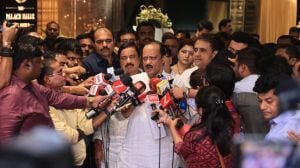War of words
The initiation of talks between the outlawed People’s War Group and the Andhra Pradesh government is indeed a welcome development. Howe...

The initiation of talks between the outlawed People’s War Group and the Andhra Pradesh government is indeed a welcome development. However, with a backdrop of mutual suspicion characterising relations between the two sides, it is anybody’s guess how far this fresh effort at rapprochement would go.
Already, Chief Minister Chandrababu Naidu has expressed apprehensions that the talks would fail and PWG emissaries have voiced misgivings over the government’s sincerity in the wake of fresh attacks on their cadres.
Sanity demands, however, that the cycle of violence that has claimed over 5,000 lives in the state in a 34-year war of attrition must stop without delay and mutual mud-slinging must give way to a spirit of accommodation if the talks are to have any meaning.
The PWG has often been accused of resorting to mindless massacres which are far divorced from its avowed original objectives. On the other hand, the police have time and again been charged with giving a go-by to legal methods in tackling the problem and eliminating extremists and PWG sympathisers in what were widely believed to be fake encounters.
It goes to the credit of the Committee of Concerned Citizens (CCC) comprising former civil servants, academics and other intellectuals a year ago that the two sides have at least agreed to begin a constructive dialogue.
The talks between the PWG representatives — revolutionary writer and lawyer Vara Vara Rao and popular balladeer Gadar — and the government nominees — Ministers K. Vijayarama Rao, a former CBI director and T. Sitaram — are still in a very preliminary stage but one silver lining has been provided by the government’s belated but welcome admission that Naxalism is not merely a law and order problem but a multi-dimensional issue involving socio-economic aspects.
The PWG on its part must give evidence of its sincerity by fighting for the rights of people through democratic means without recourse to violence and coercion.
Every act of destruction of property and intimidation of people strikes at the root of the state’s economic well-being and thereby further impoverishes the masses. The state has indeed suffered incalculable damage from the violence of the last three decades. It is time now to give peace a fair chance.
For that to be agreed upon, there is need for restraint and reasonableness on both sides.



- 01
- 02
- 03
- 04
- 05




























